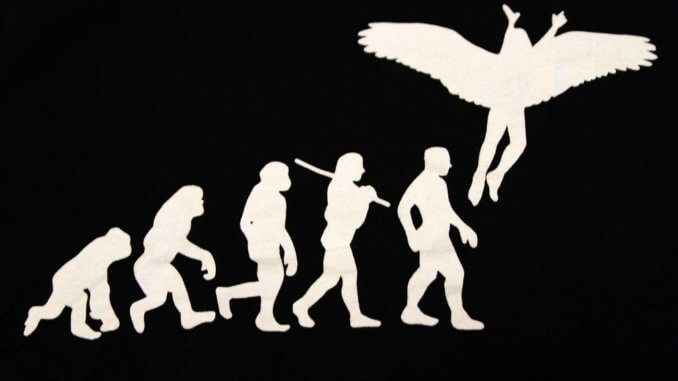
In 2002, the philosopher John Gray published a curiously titled book, Straw Dogs, in which he boldly challenged one of the most powerful and pervasive narratives of our time – a narrative which has become so influential in Western society today that it has overtaken some of the major religions in terms of its popularity and reach. The target of Gray’s criticism is the narrative of social progress. The story of how we – as a species – have the power to create and shape a future that is better than the past: a future in which science prevails over superstition; where technology frees us from the constraints of our physical environment; and where liberal values and democratic systems of accountability spread across the world.
That this narrative of social progress has been so widely embraced in Western culture is perhaps unsurprising, for it seems hard to conceive of a period in history where life was better than it is in the West today: the majority of us have access to running water, electricity, good sanitation, decent healthcare and education; advances in scientific and medical research have made things possible that would once have seemed unimaginable; and our societies have become more inclusive and tolerant, with the rights of minority groups protected by the law. However, as Gray argues, many of these gains – in particular the political and social gains – are unlikely to be permanent. For while it is indisputable that our scientific knowledge is increasing and is likely to continue to do so, this growth does not automatically go hand-in-hand with a progression in our ethics and politics:
“In science, the growth of knowledge is cumulative. But human life as a whole is not a cumulative activity; what is gained in one generation may be lost in the next. In science, knowledge is an unmixed good; in ethics and politics it is bad as well as good. Science increases human power – and magnifies the flaws in human nature. It enables us to live longer and have higher living standards than in the past. At the same time it allows us to wreak destruction – on each other and the Earth – on a larger scale than ever before.” 1

Indeed, the destructive qualities of human nature are evident throughout history; qualities which, if anything, have only been amplified through science. Gray, rather provocatively, uses the example of the Holocaust to illustrate this point. Without the invention of the railways, the telegraph and poison gas, he argues the Nazis would not have been able to carry out the scale of mass murder they perpetrated during the 1930s and 40s. Viewed in this way, the Holocaust was simply the catastrophic outcome of the very worst aspects of human nature colluding with the latest advances in science and technology. And to Gray, this devastating combination was – and continues to be – somewhat inevitable, for “though human knowledge will very likely continue to grow and with it human power, the human animal will stay the same: a highly inventive species that is also one of the most predatory and destructive.”2
Critics of Gray might dismiss his arguments for being too pessimistic about human nature. Indeed, they could point to the fact that political diplomacy and global co-operation has resulted in an unprecedented period of (relative) world peace for over fifty years. Surely this provides evidence of social progress? Straw Dogs, however, poses some rather uncomfortable questions to adherents of this worldview. In particular, Gray questions whether this period of relative peace represents a permanent step forward towards a better world, or a temporary reprieve from what history would suggest is the more normal state of human affairs: one which involves conflict, war and tyranny. And as Gray makes abundantly clear, the road ahead entails some very significant challenges: climate change, the problem of dwindling resources, new patterns of disease, and artificial intelligence to name but a few. The question is: will our current political and social frameworks survive these tests? Recent events – such as the election of Donald Trump, the Brexit vote, and the rise of right-wing populist parties in Europe – would suggest that the Western liberal consensus is not as secure as was once presumed.
There are, of course, many prominent and esteemed thinkers who have rallied against Gray’s gloomy predictions of the future, instead arguing that we will find a way – through science – to cope with the many challenges that lie ahead (see in particular Stephen Pinker’s recent book Enlightenment Now). We could, for example, develop new technologies to limit the damage we are inflicting on the planet, and find new medical therapies to combat devastating and deadly diseases. Moreover, the invention of artificial intelligence could help us find solutions to problems that have, so far, proved insoluble such as the scarcity of resources. Unsurprisingly, Gray is very sceptical of these arguments which, to him, are premised on nothing more than a form of superstition, no different from the stories and myths propagated by some of the world’s major religions:
“Science promises that the most ancient human fantasies will at last be realised. Sickness and ageing will be abolished; scarcity and poverty will be no more; the species will become immortal. Like Christianity in the past, the modern cult of science lives on the hope of miracles. But to think that science can transform the human lot is to believe in magic…….Even as it enables poverty to be diminished and sickness to be alleviated, science will be used to refine tyranny and perfect the art of war.” 3
Interestingly, Gray argues that members of the scientific community that have fallen prey to the narrative of social progress have unknowingly – and rather ironically – embraced a worldview rooted in Christianity. For it was here, Gray explains, that humans first came to be seen as different to – and elevated above – animals, capable of rational and therefore moral thought and action. In pagan religions, Gray observes, humans and animals were seen as no different; they possessed no illusions that they had the power and capability to fundamentally change the world around them. As a result, the pagans never bought into the idea of progress:
“In pre-Christian Europe it was taken for granted that the future would be like the past. Knowledge and invention might advance, but ethics would remain much the same. History was a series of cycles, with no overall meaning. Against this pagan view, Christians understood history as a story of sin and redemption……….The idea of progress is a secular version of the Christian belief in providence.” 4

Because of his relentless attacks on the narrative of human progress, Gray has been painted as a philosopher of pessimism. But it is entirely possible that his philosophy offers a more realistic assessment of the human condition than a worldview based on the premise of gradual but inevitable improvement. For many people, however, Gray’s vision of the future is simply too distressing to contemplate, for if we cannot have faith in progress then how are we to live today? Gray has clearly spent a lot of time pondering this question and provides a number of interesting answers. In particular, he points us towards the Ancient Chinese philosophy of Daoism, from which he draws inspiration for the title of his book.
Daoists emphasise the need to live in harmony with the “Dao”, which can be literally translated as “the Way”, and refers to the natural flow of reality. Living in accordance with a Daoist philosophy does not mean we should not engage in any form of action, but to Gray at least, it appears to involve some level of acceptance that in the longer term, we do not have the power to change what is ultimately the natural course of events. This need not be a depressing idea. For as Gray argues, most people who have ever lived have not believed that they could change the world for the better, yet they have still led happy and fulfilled lives. Moreover, Gray’s philosophy can enable us to develop an appreciation for what we have today. For if the hard-won freedoms we have come to enjoy are only temporary, then that makes them all the more precious.
Further Resources
Gray’s rejection of the idea of human progress underpins much of his work and acts as a central theme in at least three of his other books: Gray’s Anatomy, Heresies: Against Progress and other Illusions and The Silence of Animals: On Progress and Other Modern Myths
We would also recommend reading Gray’s recent New Statesman article How We Entered the Age of the Strongman, in which he expands upon some of the ideas within Straw Dogs to provide a unique perspective on the current political climate.
John Gray also makes regular contributions on BBC Radio 4, and we would recommend listening to two recent programmes where he provides his point of view on current affairs: Modern-Day Empires and The Revolution of Capitalism.
You can also find further video resources on this topic at our Mind Attic YouTube channel playlist.



